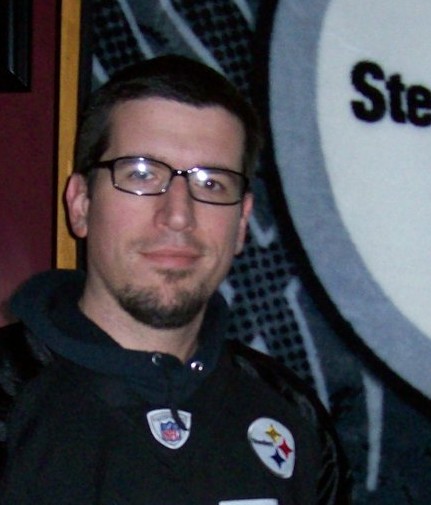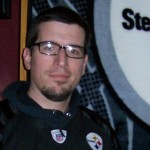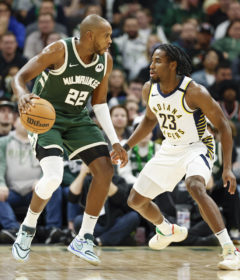Calinger: Stories of Lawrence Phillips, Darth Vader painfully similar

By J.W. CALINGER
ISL Correspondent
Often enough, things are more similar than they appear, and one thought that popped into my head about the time that Episode I of the “Star Wars” saga premiered was how similar the story of Anakin Skywalker was to that of a certain Nebraska running back, Lawrence Phillips, who just couldn’t appear to stay out of trouble.

Phillips never ruled the galaxy, of course and, sadly, he never was redeemed – his life just ended in a prison cell in California, probably by his own hand. But, some of the other elements of the story are so similar, it’s a little scary, especially given the popularity of college football and its entrenchment in our culture.
Consider this: Anakin Skywalker was born and raised on a backwater planet. He had no father, and since his mother was a slave, young Ani had nothing to look forward to except a life of drudgery as a slave himself. Yoda eventually sensed fear and other various dark emotions in him, and a person can’t be surprised, given what happened to him on Tatooine, and what he expected for most of his young life.
Then, some uniformed sages came and took him away. They couldn’t take his mother, but they saved him and took him to a bright, shiny place where he was well-fed, educated, and given the best physical and spiritual training to bring out his already remarkable abilities. Eventually, he was a step away from being a full Jedi Knight, and enjoying a generous amount of status and power in his community.
With all the training and the education, though, the darkness remained. Ani missed his mother, he was forbidden to have what he wanted most – love – and he had some other various resentments and fears. Little by little, he became Darth Vader, and he became feared by all.
According to Wikipedia, Phillips was raised mostly in California, where he lived in foster homes. If not for athletics, he also would have had little to look forward to as a life of drudgery. Considering that he lived in multiple foster homes, I’m sure it was hard for him, too, to find stability and peace, and it was easy, on the other hand, for him to develop anger and fear.
But, some uniformed sages – in this case, Coaches Tom Osborne and Frank Solich – took him away, to a bright, shiny place, the University of Nebraska. Phillips was well-fed, educated, clothes, and given the best physical training to bring out his athletic ability, not to mention whatever under-the-table benefits folks might have handed him. He was the starting running back for the Nebraska Cornhuskers, at a time when there was no position in the state with greater status.
But, as with young Mr. Skywalker, the darkness remained. He had his resentments and fears, and he got into trouble here and there – charges of assault and vandalism here, letting an agent buy him lunch there, and so on. During his final year, he beat his girlfriend, thereby going from hero to utter jerk, literally overnight.
Many Nebraskans fault Osborne for not removing Phillips from the team immediately, and they accuse Osborne of keeping Phillips just to win the National Championship. I highly doubt that; the Huskers had enough talent at running back to rout anyone, and Osborne knew it. I think Osborne genuinely believed that a young man like Phillips could be redeemed, and could heal inside. And so, Phillips finished his career with a stellar performance in the Fiesta Bowl and a National Championship ring.
So, Phillips didn’t destroy an entire planet, but he broke hearts and caused his share of controversy around Lincoln and Omaha and, among hard-core college sports fans, around the Big Eight and the country.
There’s a saying, “Wherever you go, there you are”, and the Dark Side either was in Phillips or just a step away wherever he went. The St Louis Rams were the first team to give him a chance; they were confident enough in him to trade some guy named Jerome Bettis to the Pittsburgh Steelers. But, he made enough trouble in St Louis, that he wore out his welcome in less than two seasons. He went to Miami for a few games, only to plead no-contest to another assault on a woman. After a pretty good season in NFL Europe, in which he established a single-season rushing record for the league that still stands, the San Francisco 49ers gave him a chance. While he didn’t get into off-the-field trouble, he had enough issues with the team that in late 1999, they waived him.
Somehow, Phillips wrangled a Canadian work visa, and he not only made the roster of the Montreal Alouettes of the Canadian Football League, but he won his first and only professional championship, the Grey Cup. But, after various crimes and disputes with coaches, he was released from the Alouettes and, later, from the Calgary Stampeders; he then took his Dark Side back to the United States.
After being convicted of various other crimes, which I feel no need to describe since Phillips no longer was a public figure, he went to prison and, after a development in a case against him – he was charged with murdering his cellmate – he apparently committed suicide.
It’s easy to disagree with teams giving a chance to a person with a record of awful behavior, but also easy to understand it. There’s a minimal risk, in money and in publicity, and a potentially high reward. What’s harder to understand, for most people, is how a person with so many chances to succeed will fail nonetheless, repeatedly. I didn’t understand that, until I came to understand Anakin Skywalker.
I understand that you can’t pay the Dark Side out of someone, and you can’t physically train it out either. You can educate it out of someone, if the education is done correctly. Mostly, though, people have to face their Dark Sides head-on. People like Anakin Skywalker in fiction, and like Lawrence Phillips in real life, have to find peace, and the real trouble is that neither person was in an environment where peaceful attitudes are encouraged.
I don’t feel sorry for Lawrence Phillips, because his victims deserve my sympathy first. But, I do find it sad when any promising young person fails repeatedly because of inner demons. I suppose I can connect it to myself a little, in that while autism, with which I live, isn’t evil, it certainly ruined a few chances for me before I learned to handle it. I certainly wish, for everyone’s sake, that Phillips had been able to face his Dark Side early in life. I hope major colleges have learned how to deal better with people like him, though I always will wonder who will be the next player to go over to the Dark Side. Meanwhile, since I don’t personally believe in an afterlife, I can take a little comfort in knowing that a troubled and perpetually angry young man now is at peace; his Dark Side having expired along with him.






